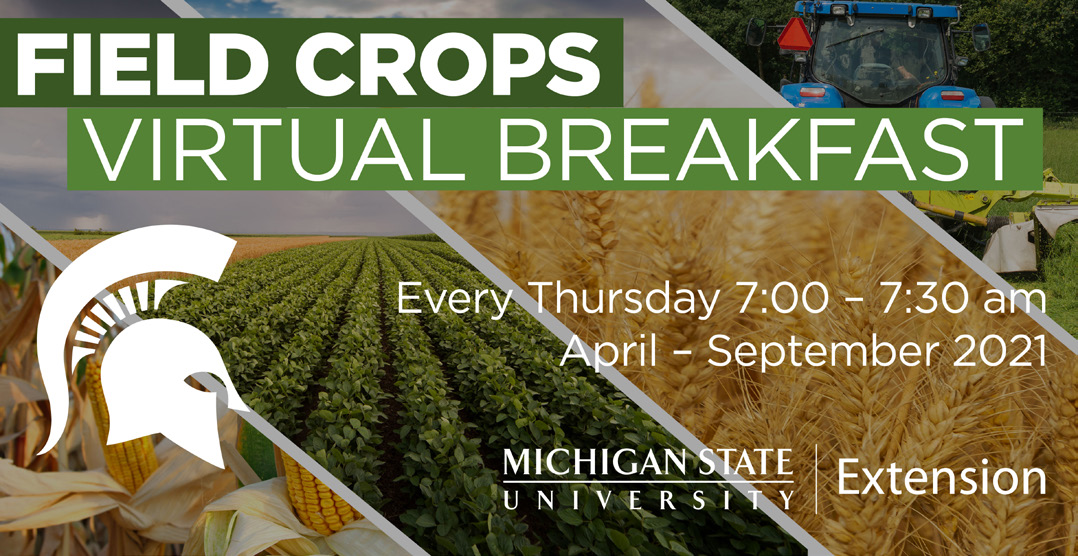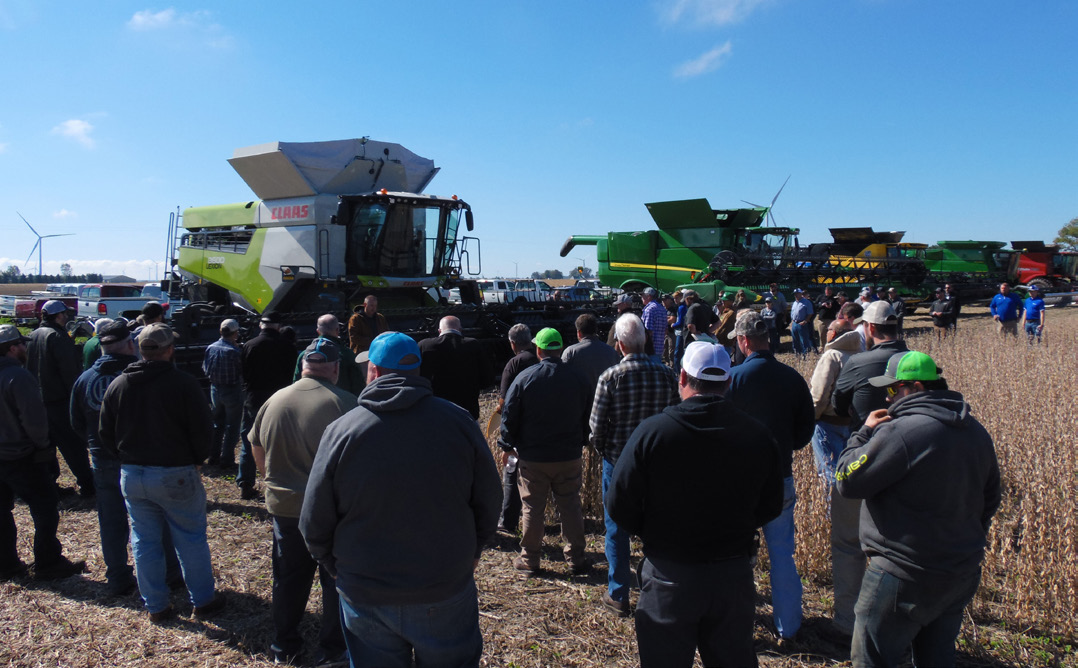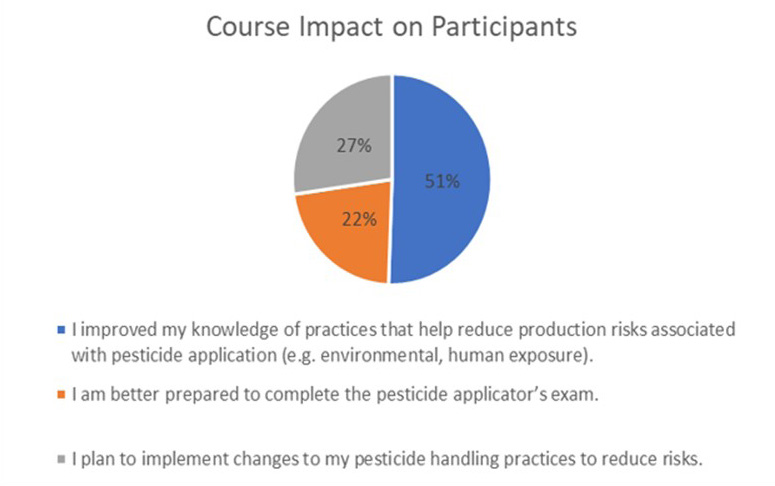
Providing Timely and Relevant Information for Field Crop Producers in Challenging Times
DOWNLOADOctober 11, 2022 - Michigan State University Extension
Impacts
Michigan State University (MSU) Extension works to improve farm personnel well-being and income, expand agriculture-related businesses and increase employment opportunities, making agriculture one of the strongest industries within Michigan. Supporting agriculture and helping to improve financial stability and competitiveness has a significant economic impact on Michigan and local communities.
- 11,565 Direct participants: 30% in-person, 68% webinar/online, 2% mix
- People impacted by indirect efforts: radio interviews (371,471), articles (52,198), video recordings (31,118), hard copy materials (30,894), website visits (22,380)
- Our numbers: 100 articles, 28 videos, 18 social media, 17 electronic materials, 16 podcasts
- 94% of people indicate improvement in knowledge because of programming.
- 74% of farms/businesses intend to make changes because of programming.
- 1,653,769 acres are impacted by intended changes.
- $13,282,874 revenue or savings increased because of intended changes.
Priority Areas
Michigan’s unique freshwater resources, climatic zones and soil types contribute to its status as the second most diverse agricultural state in the country. According to the U.S. Department of Agriculture’s 2017 Census of Agriculture, field crops grown in Michigan include corn, soybean, alfalfa/hay and small grains, as well as important specialty row crops such as sugarbeets, potatoes and dry beans. Field crops as a whole account for approximately 32% of the market value of Michigan agricultural products, and five field crops in particular—corn, soybeans, sugarbeets, potatoes and wheat—are among the top 10 commodities produced in the state in terms of gross value.
The 2021 Field Crops Virtual Breakfast Series

The 2021 Field Crops Virtual Breakfast Series was a weekly webinar for farmers, agribusiness personnel and others interested in agriculture. The series, which ran for 26 weeks, was conducted during the growing season with a focus on field crop and pest management, soil health, soil management, cover crops and financial management. Each week, MSU Extension specialists and educators as well as other guests provided brief presentations on various topics followed by a detailed weather analysis for the state. Each session concluded with a 30-minute Q&A segment. Participants were encouraged to interact with MSU Extension specialists and educators to get answers for their questions on field crop production and management topics. Each week, restricted use pesticide and certified crop advisor recertification credits were available to participants. The series was live streamed via Zoom and on Facebook for easy accessibility. Recordings were available for later viewing with closed captioning on the MSU Extension Field Crops website and outlets such as YouTube, Facebook, Spotify and iTunes.
The Field Crops Virtual Breakfast Series addresses the field crops producers’ need for current information about conditions and the potential impact on field crops concerning insects, weeds, diseases, soil conditions, fertilizer usage and weather. Because things change fast during the growing season, this information helps producers and agribusiness professionals address possible management options associated with emerging issues and concerns.
The 2021 Field Crops Virtual Breakfast Series reached 3,180 participants live, with over 21,000 additional views through YouTube, social media and the MSU Extension website. Participants tuned in from Michigan and all over the country, including from Indiana, Minnesota, New York, Ohio, Texas, Vermont and Wisconsin, as well as internationally from Canada, India, Nigeria and South Africa.
Based on evaluation results:
- 97% of participants indicated that their knowledge increased because of the series.
- 63% planed management changes based on the information presented, with 80,810 total acres impacted.
- $8.42 is the average dollar increase in value per acre.
- $723,439 (or $8,221 per farm) is the total dollar value of increased management.
"The series was very well presented; the hosts and guest speakers were very well versed in their fields. I really appreciated the ability to ask the presenters any questions I had." -Field Crops Virtual Breakfast participant
Crop and Pest Management Winter Meetings
During the winter season, the field crops team holds several statewide and regional meetings to provide agribusiness representatives and farmers with a timely update on research results and recommendations from MSU Extension specialists and educators. These meetings begin in December with Thumb Ag Day and the statewide Integrated Crop and Pest Management Update. In January and February, Regional Pest and Crop Management Update meetings are also held throughout the state, focusing on issues specific to each region. Eight winter meetings took place during the 2020-21 winter season. Due to the COVID-19 pandemic, all meetings took place virtually.
A wide range of specialists and educators on the field crops team gave presentations on an equally wide range of topics, including updates on research results and observations from the 2020 crop season; weed, insect, and disease control and resistance management for 2021; changes to the MSU Extension Weed Control Guide for Field Crops (E0434) for 2021; soil fertility and nutrient management considerations for 2021; and agronomic best practices for corn, soybean and wheat production, among others. Attendees of most of these programs receive a free copy of the weed control guide each year due to the generous support of our soybean, corn and wheat commodity partners.
Following each event, the team distributed an electronic survey to gauge impact and request feedback, and 676 people completed these surveys. A total of 637, or 94%, indicated they had improved their knowledge of the subjects from the programs, and 411, or 61%, planned to make a change to their farming operation or recommendations to clients as a result of the programming. Respondents estimated that these planned changes would impact 1,329,343 acres resulting in $11,064,155 in increased revenue or savings, or $8.32 per acre on average.
"Very much enjoyed the online format. Glad that I didn’t have to travel. Able to easily hear and see speakers. Would enjoy doing it virtually in the future." -Crop and Pest Management Winter Meeting participant
MSU Extension/Michigan Soybean Committee Partnership
MSU Extension and the Michigan Soybean Committee (MSC) collaborated to conduct a wide variety of research and educational projects in 2021. The MSC lost key personnel to retirement and a career change, leaving them shorthanded entering the 2021 growing season. In response, the MSC provided funding for six MSU Extension educators to coordinate 23 of the 67 on-farm trials conducted in 2021.
Due to COVID-19, MSU Extension and MSC were unable to hold two long-standing and high-profile in-person meetings: the on-farm research updates and the Michiana Irrigated Corn and Soybean Conference. Four virtual on-farm research updates were conducted reaching more than 200 producers and agronomists and the Michiana conference was also conducted virtually reaching 153 participants.
The first-ever MSU Soybean Research and Crop Management Field Day was planned and conducted at MSU to meet a need identified by the MSC. Seven MSU specialists showcased current research and shared crop management recommendations with 40 participants. MSU Extension and MSC also collaborated to help soybean producers respond to challenging harvest conditions. Six timely and relevant articles were produced receiving more than 4,500 pageviews. Recommendations for reducing harvest losses were presented on Ag PhD radio reaching over 300,000 producers across the U.S. The partnership also conducted the 10th annual soybean harvest equipment field day, providing another 63 producers and equipment company representatives with information for overcoming difficult harvest conditions.
Follow-up evaluations (measuring what the participants did instead of what they intended to do) showed that 81 producers implemented the new information they learned in 2021 and 52 producers actually earned or saved additional money by implementing the new information. The average amount of added income reported was $9.46 per acre applied to 38,315 acres, producing an actual financial impact of $362,642 in 2021.

"This meeting made me much more aware of the importance of measuring harvest losses throughout the harvest season. My main objective was to see the different types of equipment operate in the field and this objective was met. Great meeting." -Soybean Harvest Equipment Field Day participant
Pesticide Applicator Training

MSU Extension developed an online course published November 2020 for private and commercial pesticide applicators. This course is designed for new certification and those in need of further education or credits toward their restricted use pesticide (RUP) certification. Those that complete the course obtain 12 RUP credits (private or commercial core). Find course information and registration at the MSU Extension Pesticide Training website (https:// www.canr.msu.edu/courses/pesticide-applicator-training).
Private and commercial pesticide applicators have embraced the self-paced 12-hour course. In 2021, 116 applicators took the course, mostly to obtain recertification credits (about half commercial, the other half private) but others took it for a variety of reasons including to study for the exam, to better understand pesticide application and pesticide safety, and to prepare to teach an ag class. Students that took the course were from 42 counties in Michigan and make management decisions for 39,895 acres. These students grew or managed field crops as their primary commodity. Participants were asked how this course will impact their knowledge to take the pesticide exam as well as their comfort and knowledge to apply pesticides. Results appear in the figure on the left.
"This online course was well planned out and easy to use." -Pesticide applicator training participant



 Print
Print Email
Email
